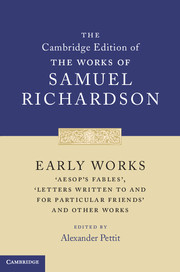Book contents
- Frontmatter
- Dedication
- Contents
- General Editors’ Preface
- Acknowledgements
- Chronology
- List of Abbreviations
- General Introduction
- Textual Introduction
- The Apprentice’s Vade Mecum (1733)
- A Seasonable Examination of the Pleas and Pretensions (1735)
- Preface to Aubin, A Collection of Entertaining Histories and Novels (1739)
- Aesop’s Fables (1739)
- Letters Written to and for Particular Friends (1741)
- Six Original Letters Upon Duelling (1765)
- Appendix: The Infidel Convicted (1731)
- Postscript
- Emendations
- Word-division
- Bibliographical Descriptions of Early Editions
- Explanatory Notes
- Index
Letter CXL
Published online by Cambridge University Press: 30 June 2022
- Frontmatter
- Dedication
- Contents
- General Editors’ Preface
- Acknowledgements
- Chronology
- List of Abbreviations
- General Introduction
- Textual Introduction
- The Apprentice’s Vade Mecum (1733)
- A Seasonable Examination of the Pleas and Pretensions (1735)
- Preface to Aubin, A Collection of Entertaining Histories and Novels (1739)
- Aesop’s Fables (1739)
- Letters Written to and for Particular Friends (1741)
- Six Original Letters Upon Duelling (1765)
- Appendix: The Infidel Convicted (1731)
- Postscript
- Emendations
- Word-division
- Bibliographical Descriptions of Early Editions
- Explanatory Notes
- Index
Summary
To a Gentleman of Fortune, who has Children, dissuading him from a Second Marriage with a Lady much younger than himself.
Worthy Sir,
You are pleased to inform me of your Thoughts in relation to a Change of your Condition, and to command me to give you freely my Opinion of the Conveniencies and Inconveniencies, that may follow from the Inequality of Years between you, and the young Lady you think of making your second Wife. Indeed, I am so much concerned for your Happiness, that had I heard of such your Intention, and had not your Commands to be free on this Head, I think I should have run the Risque of being thought impertinent and officious, rather than not have expostulated with you on this Occasion. My Objections, Sir, are not so much to the Gaiety of the Lady, as to her Youth, and the Children you have already by your late excellent Lady: And when you remember, that Miss Fanny, your eldest Daughter, is near as old as the Lady you think to make her Mother, I beg, Sir, you will consider how your Reputation, as to Prudence, will suffer in the Eye of the World without you, as well as the Look it will have to your Children and Domesticks.
Nature, Justice, Decency, and every Branch of human Prudence, plead strongly against the Union of lively Youth withmaturer Years. Her Temper may be very agreeable: So indeed is yours——But may they be so to each other, when they meet together in so close an Union? You are yet blest with a good State of Health; but can you expect, that it will be always so?—Or rather, will not every Year take from your Constitution, what it will add to hers, for several Years to come? Your Years make you serious and solemn, and you are past a Relish for those Pleasures and Amusements, which are but suitable to hers, and which at the same Age you yourself delighted in. Can you recall Time past? Will it become you to resume the Part which Judgment has made you quit?
- Type
- Chapter
- Information
- Early Works'Aesop's Fables', 'Letters Written to and for Particular Friends' and Other Works, pp. 464 - 466Publisher: Cambridge University PressPrint publication year: 2011

